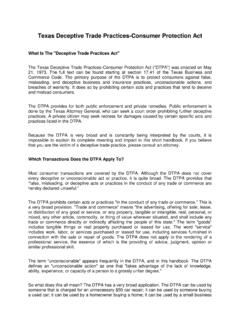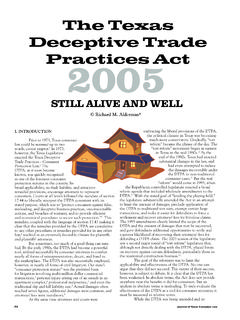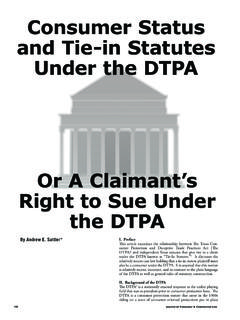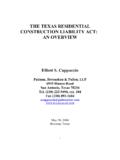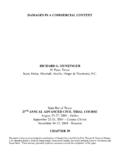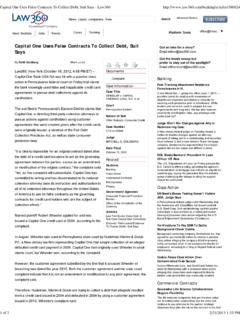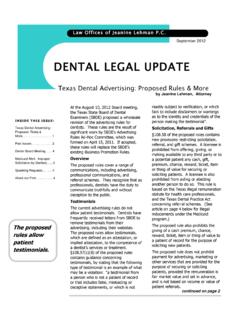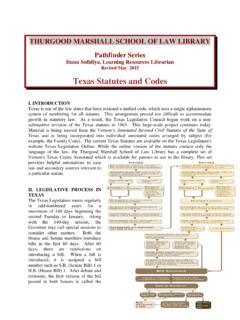Transcription of Texas Deceptive Trade Practices-Consumer …
1 Texas Deceptive Trade Practices-Consumer protection Act What Is The " Deceptive Trade practices Act" The Texas Deceptive Trade Practices-Consumer protection Act ("DTPA") was enacted on May 21, 1973. The full text can be found starting at section of the Texas Business and Commerce Code. The primary purpose of the DTPA is to protect consumers against false, misleading, and Deceptive business and insurance practices , unconscionable actions, and breaches of warranty. It does so by prohibiting certain acts and practices that tend to deceive and mislead consumers. The DTPA provides for both public enforcement and private remedies. Public enforcement is done by the Texas Attorney General, who can seek a court order prohibiting further Deceptive practices . A private citizen may seek redress for damages caused by certain specific acts and practices listed in the DTPA. Because the DTPA is very broad and is constantly being interpreted by the courts, it is impossible to explain its complete meaning and impact in this short handbook.
2 If you believe that you are the victim of a Deceptive Trade practice, please consult an attorney. Which Transactions Does the DTPA Apply To? Most consumer transactions are covered by the DTPA. Although the DTPA does not cover every Deceptive or unconscionable act or practice, it is quite broad. The DTPA provides that "false, misleading, or Deceptive acts or practices in the conduct of any Trade or commerce are hereby declared unlawful." The DTPA prohibits certain acts or practices "in the conduct of any Trade or commerce." This is a very broad provision. " Trade and commerce" means "the advertising, offering for sale, lease, or distribution of any good or service, or any property, tangible or intangible, real, personal, or mixed, any other article, commodity, or thing of value wherever situated, and shall include any Trade or commerce directly or indirectly affecting the people of this state." The term "goods" includes tangible things or real property purchased or leased for use.
3 The word "service" includes work, labor, or services purchased or leased for use, including services furnished in connection with the sale or repair of goods. The DTPA does not apply to the rendering of a professional service, the essence of which is the providing of advice, judgment, opinion or similar professional skill. The term "unconscionable" appears frequently in the DTPA, and in this handbook. The DTPA defines an "unconscionable action" as one that "takes advantage of the lack of knowledge, ability, experience, or capacity of a person to a grossly unfair degree." So what does this all mean? The DTPA has a very broad application. The DTPA can be used by someone that is charged for an unnecessary $50 car repair; it can be used by someone buying a used car; it can be used by a homeowner buying a home; it can be used by a small business purchasing materials; it can be used by a business buying a $400,000 franchise; and it can be used in all transactions in between.
4 Simply put, the DTPA was enacted to protect consumers in small transactions and businesses in rather large transactions. Who Is Entitled To protection Under the DTPA? Other than the Texas Attorney General, only consumers are allowed to file under the DTPA. The phrase " consumer " means an individual, partnership, corporation, or governmental entity who seeks or acquires by purchase or lease any goods or services. It does not cover a business consumer that has assets of $25 million or more or that is owned or controlled by a corporation or entity with assets of $25 million or more. The Element of Knowledge or Intent The DTPA makes many practices illegal without requiring proof that the defendant intended to do something wrong or illegal. Unless the section involved requires otherwise, the consumer is not required to prove that the defendant ": intentionally" or "knowingly" violated the DTPA. This makes it easier to prove a violation of the DTPA, and provides a strong incentive for sellers of goods and providers of services to refrain from engaging in the prohibited acts and practices .
5 Nevertheless, the DTPA provides that if a defendant acts "intentionally," the judge or jury may award the consumer "additional damages" in an amount not exceeding three times the actual damages suffered by the consumer . What Is Included Within the "Laundry List" of Acts and practices Made Illegal by the DTPA? The DTPA contains a "laundry list" of specific practices that are prohibited. This laundry list is found in section (b) of the Texas Business and Commerce Code. It contains 27 acts that violate the DTPA and for which consumers may sue, if the consumers relied on the act to their detriment. These twenty-five acts are described on the following pages. (1) Passing off goods or services as those of another. It is illegal to advertise or represent goods or services under a different company than the company in which the good or services were made. (2) Causing confusion or misunderstanding as to the source, sponsorship, approval, or certification of goods or services.
6 This section prohibits acts that tend to confuse consumers. First, this section prohibits acts that tend to cause confusion regarding the source of goods or services. This section is broader than section (1) because the consumer need not prove that the defendant was actually "passing off" goods or services as those of another. Instead, all the consumer must show is that the defendant caused confusion regarding the source of the goods or services. This section also prohibits acts that cause confusion regarding the sponsorship, approval, or certification of goods or services. It prohibits people from representing a product has the approval of an organization that has not really approved it. Certification is a formal process that often has significant meaning to consumers. Examples of certification includes various seals of approval, such as the Good Housekeeping Seal and the or Underwriters Laboratories certification for electrical products.
7 (3) Causing confusion or misunderstanding as to affiliation, connection, or association with, or certification by, another. This section prohibits acts or practices that cause confusion regarding the affiliation or relationship between the seller of goods or the provider of services and some other organization or person. For example, this section prohibits business owners from giving the impression that their company is closely connected with another business or with the state government or an agency of the state government. (4) Using Deceptive representatives or designations of geographic origin in connection with goods or services. This section prohibits people from stating that products come from a certain country or location when, in fact, they did not. This would include stating falsely that a certain wine is from France, a fine watch was made in Switzerland, or a certain coffee is made from beans grown in Columbia.
8 (5) Representing goods or services that claim to have sponsorship, approval, characteristics, ingredients, uses, benefits, or quantities but do not or a person claiming to have a sponsorship, approval, status, affiliation or connection but does not. This section has two main parts: one concerning misrepresentations about goods or services and the other concerning misrepresentations about authority. It is illegal to represent that goods and services have sponsorship or approval when they do not. This is similar to section (2) above. It is also illegal to represent that goods and services have characteristics, ingredients, uses, benefits, or quantities that they do not. For example, it is illegal to represent that a product is made out of steel when it is really made out of aluminum. Moreover, this provision forbids a salesman from telling you that goods have features that they do not have or that the goods can do things that they cannot do.
9 Misrepresentations about quantities include misstating the number of acres being sold in a real estate transaction and misstating the number of items contained in a box of candy. Misrepresentations about benefits of goods or services include misrepresentations about the ailments that a medicine can cure and the effect upon one's self after only three visits to a health spa. Misrepresentations about ingredients include stating that a product contains vegetable fat when it really contains animal fat. This section also prohibits misrepresentations regarding the sponsorship, approval, status, or affiliation of an individual. It prohibits misleading and false statements about the nature and authority of a person. For example, an accountant may not claim to be a Certified Public Accountant if that person has not taken and passed the CPA exam. Also, physicians may not represent themselves as qualified specialists when they are not.
10 (6) Representing that goods are original or new if they are deteriorated, reconditioned, reclaimed, used, or second-hand. This section prohibits sellers from passing off secondhand or reconditioned goods as new. This section affects many types of goods which might be sold, used on a trial basis, returned and then resold again as "new." The Federal Trade Commission has guidelines regarding the amount of prior use that is allowed before a good can no longer be sold or advertised as "new." (7) Representing that goods or services are of a particular standard, quality, or grade, or that goods are of a particular style or model, if they are of another. This section covers statements made to induce a consumer to choose a certain item. It prohibits misrepresentations concerning certain specific quality or model designations. A very general statement, such as "this is a high quality product" or "this is a top-of-the-line model" may not violate this section, even if the good is of poor quality because the representation is too broad and too vague.
